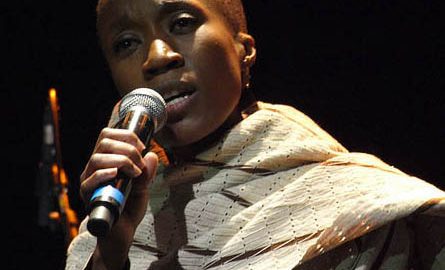Even though there will be elections in Mali on 28 Juli, the situation remains insecure and dangerous. Lots of Malian musicians are touring around the world. Not only because they are very successful, but they also need to spread the message of solidarity and unity. One of those artists is Rokia Traoré. She was at the Babel Med 2013 to receive an award and to participate in a conference about Music in Resistance with Olev Reitov (Freemuse), Mariem Hassan, and Gennardo de Rosa (Musica Contre le Maffia). At one moment she was saying something about women in polygamous marriages who expresses themselves through singing. There wasn’t much time for her to elaborate on this subject, but afterwards she found a moment in her tight schedule to tell me more about it.
by Charlie Crooijmans
As a daughter of a Malian diplomat who was posted to the USA, Europe and the Middle East, Rokia Traoré has been more out of Africa than in during her childhood. One day – after het studies in Brussels – she decided to go back to Mali to search for a new Malian identity in music. In March her fifth album Beautiful Africa is released which shows that she is an adventurous singer-songwriter with a modern African sound. In short, she is an independent woman who knows what she wants and hearing her talk about polygamy made me very curious. I even didn’t realize that Mali has one of the world’s highest rates of polygamous marriage. Here you can find more information about this.
At the conference you compared the singing of women in polygamous marriages to protest songs. Can you tell me more about that?
“If men have several wives there is clearly a sort of frustration for one of the women in every day life. Yes, they have a fair way to live all together, which is beautiful. I admire them. I know that I will never be able to take part in it. But I know many people around me, cousins or friends who are in polygamy. Sometimes you see two, three wives of the same man talking together, going to events together, wearing the same clothes. Things like that. But in some situations it is very violent and negative, and they don’t say everything. In these situations you cannot talk frankly. The way to express themselves is to sing.”
Can you give an example?
“It’s like, me: I have been working, and I will sing to you something. For example, I will sing to you how was my night with the guy last night. Just to hurt you, I will sing, “Oh my night was beautiful, what a beautiful thing, having a strong man”. So this is the way to protest. The other would also sing, “ok, even if, I am the first wife and I am here”. So this is what you cannot say. When you have no way to express yourself in another way, it is simply very natural to sing. And it exists in so many cultures in different ways and in every day life.”
In singing you have to use words. Are there more ways to show resistance in music?
“In Africa this is probably stronger than in Western countries because of our culture of oral tradition. Singing is way to resist, to express what you can’t say or write. But we have to remind that it’s not just singing. Some musicians don’t sing, they are thinking. They have a career, but they use music in this career to make a statement. Even the way they develop the career in their music. Probably music is today one of the strongest way Africans can show for them what is Africa. Music and art, culture in general. So we have this thing making this music which becomes successful in Europe. But we still continue to show us through our music. There are certain artist who are able to make what they want, who have a real artistic project, continue to make things in a way you can feel what Africa today is. And you can hear that this is not European music. This is African music, not African classical music. African music today! Probably this is a way to resist and show that, yes, there are European and international institutions think how we must be and what they think our leaders must do. But this is what we would like to be. So probably this way of making music is also a way of resistance. Through the whole career and maybe I am talking about what I think my career must be. Just being myself and being a kind of image of a whole generation. What this generation thinks. They are as African inside Africa.”
You participated in several projects that support women.
“Yes, that’s right. The most recent one is the project “One Women”, written for UN Women. This song is written for women, it’s an united women project with many African and Chinese singers. It came out in the eighth of march, on International Women’s Day.”
In this article you can watch a recent video interview with Traoré with her vision for Mali and Africa.
